BOARDWATCH: Board of Education members approve lengthy agenda featuring massive increase in privatization and charters...
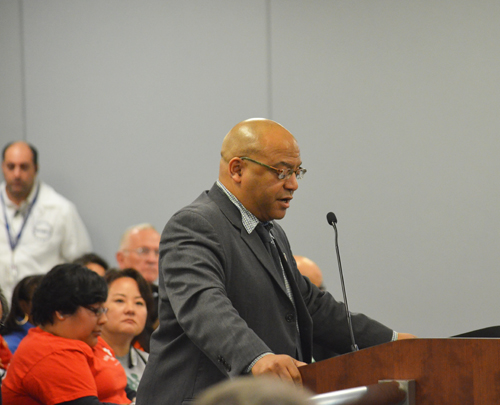 Chicago Teachers Union Recording Secretary Michael Brunson again spoke to the Board of Education. Among other things, Brunson asked the Board members to sign a pledge to go after new sources of revenue, including going for progressive income taxes. Substance photo by George N. Schmidt.While proclaiming, for the sixth or seventh year in a row, that it is facing a "billion dollar deficit," the Chicago Board of Education continued to push for expensive privatization schemes (charter school expansion; elimination of school engineers) while refusing to take actions to increase revenues for the nation's third largest schools system during the Board's monthly meeting on April 27, 2016.
Chicago Teachers Union Recording Secretary Michael Brunson again spoke to the Board of Education. Among other things, Brunson asked the Board members to sign a pledge to go after new sources of revenue, including going for progressive income taxes. Substance photo by George N. Schmidt.While proclaiming, for the sixth or seventh year in a row, that it is facing a "billion dollar deficit," the Chicago Board of Education continued to push for expensive privatization schemes (charter school expansion; elimination of school engineers) while refusing to take actions to increase revenues for the nation's third largest schools system during the Board's monthly meeting on April 27, 2016.
Any reporter who has covered the Chicago Board of Education's monthly meetings for even a few months cannot avoid but noticing the few recurrent themes. The themes are routine, no matter who is Chicago's mayor and which of the mayoral-selected spare parts are sitting in the seats on the seven-member Board of Education -- or as the latest "Chief Executive Officer." (From time to time, depending upon politics, there is also a so-called "Chief Education Officer," but since mayoral control began, that's been optional; currently there is one; before that, under Rahm Emanuel, there mostly wansn't one).
And so it was on April 27, 2016, when the Board of Education of the nation's third largest public school system met, the public was treated to a series of talking point disguised as dialogue. Then, once again, the six members of the Board present reaffirmed the Board's commitment to their continuing its attack on the city's real public schools and for the privatization of as many public education services as possible.
At the April 27 Board meeting, the expansion and re-affirmation of the charter schools returned to the agenda. Additionally, the Board was poised to virtually wipe out its remaining professional school engineers and custodians, replacing them with politically connected private contractors.
In place of evaluations of the actual performance of the privatization protagonists, the members of the Board and their CEO utilized as many diversions -- usually talking points -- as possible. And so, the monthly meeting was punctuated by the standard talking points from the Board members and the current CEO, Forrest Claypool. The main one is that everyone has to join hands in "Springfield" to demand more funding for the city's public schools.
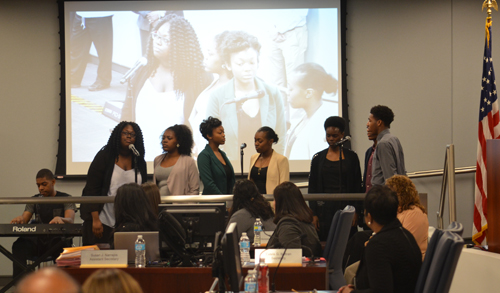 Students from Lindblom High School sang about the need for more revenue for the education of all Chicago children. Substance photo by George N. Schmidt.While most parents and the leading unions agree with this, the meeting was also an example of the fact that without a change in the structure of the Board, Chicago's school board could get another billion dollars or more in revenues and still manage to continue wasting most dollars on politically connected privatization schemes, from school custodial and lunchroom work to the ever-expanding charter schools.
Students from Lindblom High School sang about the need for more revenue for the education of all Chicago children. Substance photo by George N. Schmidt.While most parents and the leading unions agree with this, the meeting was also an example of the fact that without a change in the structure of the Board, Chicago's school board could get another billion dollars or more in revenues and still manage to continue wasting most dollars on politically connected privatization schemes, from school custodial and lunchroom work to the ever-expanding charter schools.
-- But not to support more democracy in the public schools or to get an elected school board... -- And not to support the progressive revenue solutions that tens of thousands of Chicagoans have taken to the streets and the Illinois Capital to demand... -- And not to end the grotesque juggernaut of privatization schemes that has characterized the policies of CPS, no matter who the CEO and no matter who is on the Board, since the passage of the "Amendatory Act of 1995" which gave Chicago's mayor dictatorial powers over the city's public school system.
The agenda for the April 27, 2016 Chicago Board of Education meeting was more than 250 pages long. It had been available on line for the usual 48 hours prior to the beginning of the meeting at 10:30 a.m. And most of that agenda was about privatization: the expansion of charter schools, despite the proven bankruptcy of the "charter schools model" in Chicago and across the USA. And as important, the final privatization of engineering and custodial services for the city's remaining real public schools. [img=9251]Before the public participation portion of the meeting began, the Board had two "honoring excellence" presentations. The first was from the culinary arts program at Washington High School. The second was a musical presentation on the need for more school funding by students from Lindblom High School.
The presentation by Board officials, Forrest Claypool and Denise Little, underscored the Board's version of the funding issues in "Springfield." Claypool repeated the Board's talking points about how CPS and the city's students (the majority of whom are poor) are not receiving adequate funding from the State of Illinois. As usual, local revenues, especially the local property taxes in Chicago, were completely ignored.
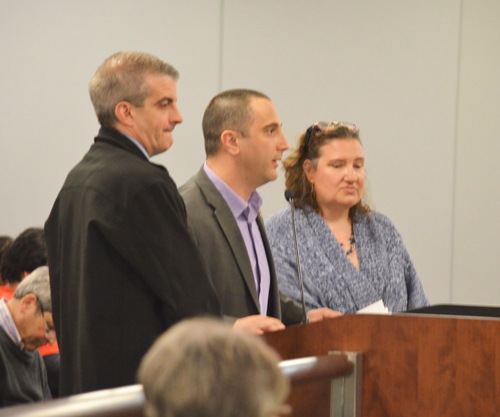 Alderman Anthony Napolitano spoke again about the problems caused by the failure of the Board to deal with the overcrowding at Dirksen and Edgebrook elementary schools. Substance photo by George N. Schmidt.Public participation began with Alderman Anthony Napolitano of the 41st Ward. He reminded the Board that he had spoken many times before about the overcrowding problems in his ward, and how these problems had not been addressed, let alone solved. Parents from Ebinger Elementary School stood with him as he spoke.
Alderman Anthony Napolitano spoke again about the problems caused by the failure of the Board to deal with the overcrowding at Dirksen and Edgebrook elementary schools. Substance photo by George N. Schmidt.Public participation began with Alderman Anthony Napolitano of the 41st Ward. He reminded the Board that he had spoken many times before about the overcrowding problems in his ward, and how these problems had not been addressed, let alone solved. Parents from Ebinger Elementary School stood with him as he spoke.
Alderman Napolitano has only held office for a year, but has been a persistent advocate for the schools in his ward. He noted to the Board that he had returned again to ask for a facilities plan to end the overcrowding at Ebinger Elementary School in the 41st Ward. He was greeted with the usual Board talking points: Join us in Springfield because we're facing a "billion dollar deficit" and need more money to make Chicago schools better. The Board members as usual evaded a few historical facts. One fact was that the Board members were recently able to find the "capital improvement" dollars to add an extension to Lincoln Elementary School near "millionaires' row" in the Lincoln Park community -- despite the fact that much public testimony demonstrated that the community did not need the expensive addition. A second was the fact that CPS used to hold annual "capital budget" hearings across the city, often as many as six in the evenings (so that the public could attend) and at schools so that the sites were convenient for parents, teachers, and the political leaders who presented their needs. After the public hearings, the Board then presented the public with a facilities plan that prioritized buildings and improvements according to a clear public plan, what is currently called "transparency." The current members of the Board of Education and Board President Frank Clark acted as if nothing of the sort had ever existed, even though two of them had been around long enough to remember the processes. There was silence about such history, and, when asked the Board members replied -- anyway, everyone must go to "Springfield" to get more money for the current Board members, all appointed by Mayor Rahm Emanuel, to spend as they chose, without any public input or a public plan.
After smiling and nodding at the alderman and the parents who stood with him, the Board went on.
Michael Brunson, Recording Secretary of the Chicago Teachers Union, spoke after Napolitan. Brunson reminded the Board of all the ways in which the Board members were refusing to address the financial issues by refusing to join the union's call for "progressive revenue solutions." Board members Mahalia Hines and Frank Clark spoke in response, but the Board refused to look for the middle ground Brunson suggested. He laughed when they told him the union should join the Board in "Springfield," demanding to know what specific pieces of legislation the Board was asking the union to join them in support of.
Brunson had also dusted off an important document, which he read and asked the Board members to sign. They ignored his request. The document read:
"I, ____________, as a member of the Chicago Board of Education, pledge that I will do everything in my power to ensure that school budgets are not slashed and that the education of our children is not jeopardized by requiring the banks, major corporations, and wealthy Chicagoans to pay their fair share. I support CEP Claypool's efforts to hold district officials accountable for graft and corruption and demand that he pursue a lawsuit against former Chicago Board of Education President David Vitale for more than $500 million he has cost the district in toxic interest rate swap arrangements. The $20 million he is suing Barbara Byrd Bennett for is chump change in comparison. I also promise that the Board of Education will advocate for local revenues sources to avert the collapse of our public school system. Therefore, I will support efforts to release an immediate TIF surplus. Additionally, we will support and explore ways that property taxes (with low income exemptions), the corporate head tax, soda, liquor and cigarette taxes, taxes on private university endowments of over $1 billion, a financial transaction tax, and city progressive tax, can be accessed to provide the schools our children deserve. Finally, I will not ask teachers and students to sacrifice lower class sizes, robust social services, and after-school programs while the wealthiest corporations and individuals shirk their responsibility to our city and its future. Lastly, I will push for CPS to participate in the state House Finance Committee hearings that are currently scheduled to win back money for CPS from the banks who can afford to return the money that was improperly taken."
The Board members received a copy of Brunson's proposed pledge and, as usual, ignored it.
After Brunson spoke, there began a parade of speakers who touted the city's expanding charter schools. First to speak were two from the Illinois Network of Charter Schools (INCS), Pam Witmer and Jalani McEwen-Torrence. At least 21 of the 60 people who signed up to speak at the meeting were touting charter schools. Many of them were allowed to speak beyond their two minutes, while critics of the Board's agenda and policies were usually cut off at two minutes, sometimes abruptly by security staff. In all there were 12 people that wanted to talk about Local School Council initiative (whatever that is)
There were 14 people that wanted to talk about school overcrowding. Contrary to some beliefs, while many CPS schools are currently underutilized (usually in areas that have been inundated with charter schools), in large areas of the city overcrowding is the problem. Parents, one alderman, and community leaders spoke out forcefully about how the Board needed to stop the overcrowding.
Later in the meeting, Dr. Philip Lacey, parent of student at Ebinger Elementary, picked up where Alderman Napolitano had begun at the beginning of the meeting. He said there is a need for a new annex. There is overcrowding at Ebinger Elementary, parents wonder day by day if the school will have a lunchroom or a gym. They wonder if children will have to eat at 10:00 in the morning. The school has had a 30% increase in the last 5 years may reach 900 students. We chose Ebinger Elementary for our children but may have to move if the school does not get more help.
Carrie Smaroff, Jennifer Rakstad, and Anna Fazekas wanted to talk about South Loop Elementary overcrowding. South Loop is about ten miles from Ebinger, but the problems are virtually the same. They speakers wanted to address the Board on South Loop Elementary’s overcrowding and its impact on our kids and community. Like Ebinger, South Loop is lauded in the district for its high test scores and other successes, but it is seeking a solution to overcrowding.
The problems of overcrowding and CPS facilities planning were not limited to "white" parts of the city.
Shango Johnson talked about the need for a new facility for the Montessori School of Englewood. Johnson stated that when he was growing up, all the children in his family were sent out of the Englewood neighborhood, but he is sending his children to The Montessori School of Englewood. “The school has a desperate need for more space and a yoga teacher," he told the Board. He noted that currently there is no library, gym or lunchroom at the school, and the students have to walk to another school for lunch and gym.
Sometimes it is not safe to walk to the other school and teachers pick up and bring food to the children. He told the Board that there was a shooting five blocks from the school so children do not go outside to play.”
Alexander Tzamburakis, another parent, repeated a need for a new facility for the Englewood Montessori school, which is supposed to be a show place for the school system. “There are 275 students attending The Montessori School of Englewood," he said, "and no playground.“ Tzamburakis told the Board members that he came to Chicago from Africa, where he had been born in Tanzania.
Facilities problems were also highlighted in what many call the "Latino commuity." Serafin Patino stood along with 14 other people and talked about the need for a building for Belmont Cragin Elementarly School. Patino stated that ”he would like to speak to the Board of the need for my child’s school to have their own building. Currently Belmont Cragin and Northwest Middle share the building and we are outgrowing our space.”
Through an interpreter Patino stated that “he is the LSC President of a school divided into two buildings. One of the buildings is a mile away." He is also a parent of a former Belmont Cragin student. His daughter is now in college studying to be a pediatrician. The school is a bi –lingual school. Belmont Cragin does not have a playground. Without emphasizing the problem of CPS privatization planning, he noted that a charter school is behind our school so there are three schools in one block. The pre- school is a mile away from our school. We need our own building –we are overcrowded. We need more public schools and no more charter schools.”
Denise Pawelko wants to address Dirksen Elementary overcrowding. “Dirksen Elementary is located close to the airport and takes in immigrants gladly. Modular buildings are supposed to be used for 10 years but we still have several. which were installed in 1970," she noted.
Chini Na Faran spoke to the Board about resources needed at Mary Lyon Elementary and Steinmetz College Prep High School. “We have wonderful teachers and Principals," she said. "They take the time to sit down with you. We want to fight for all of our CPS schools May 4. Mary Lyon is also overcrowd.” Cassandra Hernandez wanted to bring up the crowing of Mary Lyons and how we can advertise our neighborhood high schools but was not given time.
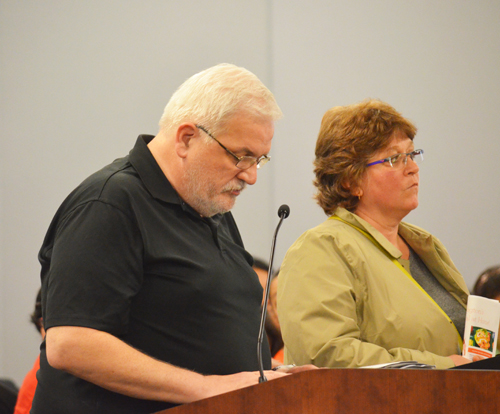 Bill Iacullo, President of the Operating Engineers Local 134, spoke against the additional privatization of engineering (and custodial) services at CPS. He was ignored, and later the Board voted unanimously to approve the additional privatization, involving Magic Johnson, who had been revealed to have been a major donor to Rahm Emanuel. Substance photo by George N. Schmidt.William Iacullo, local 143 IUOE, stated that outsourcing school engineers will cost CPS more. That CPS put out that they were outsourcing the engineers while we were still negotiating. Iacullo also stated “that CPS lost money when they outsourced janitors. Janitors used to work for free; now the Board pays $200 million. I’ve been here for 45 years (in CPS) and I’ve been going out and visiting schools. Our schools have never been dirtier. Our teachers and parents have had to bring their own cleaning supplies and clean the buildings themselves and we used to clean for free. Now you want to privatize 500 engineers?”
Bill Iacullo, President of the Operating Engineers Local 134, spoke against the additional privatization of engineering (and custodial) services at CPS. He was ignored, and later the Board voted unanimously to approve the additional privatization, involving Magic Johnson, who had been revealed to have been a major donor to Rahm Emanuel. Substance photo by George N. Schmidt.William Iacullo, local 143 IUOE, stated that outsourcing school engineers will cost CPS more. That CPS put out that they were outsourcing the engineers while we were still negotiating. Iacullo also stated “that CPS lost money when they outsourced janitors. Janitors used to work for free; now the Board pays $200 million. I’ve been here for 45 years (in CPS) and I’ve been going out and visiting schools. Our schools have never been dirtier. Our teachers and parents have had to bring their own cleaning supplies and clean the buildings themselves and we used to clean for free. Now you want to privatize 500 engineers?”
Instead of asking where the filth was, Board President Frank Clark stated “that he must have gone to some school where the principals were disgruntled.” Officially, the Board claims that the privatization of custodial services, which was begun under Barbara Byrd Bennett and her administration (Tim Cawley), has made the schools cleaner than ever (!).
Robert Lamont, Vets for Peace, wants to remove JROTC from our schools because he was in the 6th infantry in Berlin and then later a teacher in CPS. Lamont lamented the trauma of war and how it affects the soldiers. He pointed out that even military personal that work with the Dones, sent on missions, suffer from trauma. He suggested that everyone should see movies as: Let There be Light, Eye in the Sky and Men of War.
Norine Gutekanst, CTU Organizer, questioned why the Board was expanding charter schools when there are already real public community schools nearby. An example: Why are you expanding Legacy when Pope school is a block away? she demanded. Pope was almost closed? Why are you renewing eight new charters at this meeting, she demanded? This tiered system has decimated our schools, she noted. Time was called, and a CPS security guard pulled the microphone away from Gutekanst. Several charter school speakers were allowed to speak beyond their two minutes without interference.
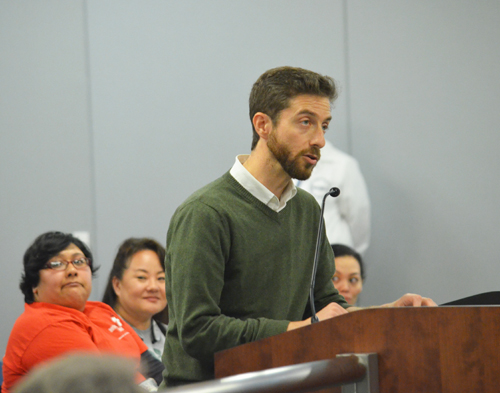 Chicago Teachers Union Staff Coordinator Jackson Potter spoke forcefully to the April 27, 2016 Chicago Board of Education meeting. Substance photo by George N. Schmidt.Jackson Potter, CTU staff coordinator, continued the factual challenges to the Board's priorities and claims. Potter noted that the caseloads for psychologists in Chicago's public schools are thee times what they are supposed to be. He added that the caseloads for social workers are seven times what they are supposed to be. Potter advised CPS that they should spend “less time dressing down teachers" and more time raising gas and liquor taxes and lobbying for progressive revenue solutions. instead of suing the Chicago Teachers Union, the Board should sue its former President, for costing them a half billion dollars from the toxic swaps that David Vitale put into place while he was serving as "Chief Administrative Officer" of CPS during the time Arne Duncan was "Chief Executive Officer." The Board members and the current CEO, Forrest Claypool, ignored the suggestion.
Chicago Teachers Union Staff Coordinator Jackson Potter spoke forcefully to the April 27, 2016 Chicago Board of Education meeting. Substance photo by George N. Schmidt.Jackson Potter, CTU staff coordinator, continued the factual challenges to the Board's priorities and claims. Potter noted that the caseloads for psychologists in Chicago's public schools are thee times what they are supposed to be. He added that the caseloads for social workers are seven times what they are supposed to be. Potter advised CPS that they should spend “less time dressing down teachers" and more time raising gas and liquor taxes and lobbying for progressive revenue solutions. instead of suing the Chicago Teachers Union, the Board should sue its former President, for costing them a half billion dollars from the toxic swaps that David Vitale put into place while he was serving as "Chief Administrative Officer" of CPS during the time Arne Duncan was "Chief Executive Officer." The Board members and the current CEO, Forrest Claypool, ignored the suggestion.
SUN TIMES STORY...
CPS kids will graduate but might skip finals if CTU strikes BY Lauren FitzPatrick, CHICAGO SUN-TIMES APRIL 28, 2016
If the Chicago Teachers Union strikes near the end of the school year, public school students can expect to graduate but might not take final exams, the district said Wednesday.
CPS had to develop some contingency plans “so that students can graduate and we can provide for families and school communities as normally as possible” in case teachers decide to walk just weeks before classes end, CPS CEO Forrest Claypool told members of the Board of Education at their monthly meeting on Wednesday.
He also quashed rumors of a “monthlong principal furlough,” saying, “we expect principals in the summer, planning for next year.”
CPS plans to give final exams during the week of June 13 but will cancel them if teachers strike, Chief Education Officer Janice Jackson told principals in an April 18 letter. Graduation ceremonies will be held regardless for high school seniors and elementary students, with help from nonunion and central staff if CTU members are walking picket lines, she said.
“The end of every school year is a busy time for you, your staff, and your students. Additionally, this year, there is the unfortunate possibility that a work stoppage will occur prior to June 21, 2016,” she wrote. “While we hope that a work stoppage will not occur, to make sure all necessary end-of-year tasks are completed, we’re providing this memo as a reference.”
She urged principals to have teachers log their students’ grades regularly and to make sure they are conducting necessary classroom observations for teacher evaluations, too.
Jackson also reminded principals to collect accurate contact information for all students “due to the potentially fluid nature of the remaining weeks in this school year. . . . Information may need to move quickly, and it is imperative you are able to facilitate that for your school community.”
The CTU could strike as early as May, now that it has rejected recent recommendations by a third-party, independent fact-finder. Whether they will do it so close to the end of the school year remains unknown, though at a meeting on Monday, members of the Big Bargaining Team leaned toward walking out in September rather than next month.
CTU membership, which already authorized a strike, would decide whether to shut schools down so close to the end of the school year or wait until the fall when classes resume. Delegates are scheduled to meet next week.


By: Edward F Hershey
Can You Believe. . .
That they're talking about handing management of engineering over to SodexhoMagic? We all know how Aramark went.
But then this looks like a setup -- took management of the engineers away from principals. Sounds like a bad idea? Well, it did cause problems. . .
Solution: Hand everything that was done in house out to a corporation or two. To solve a problem they caused in the first place.
Sounds a lot like: Broke On Purpose, come to think of it. . .